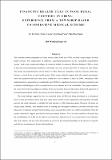| dc.contributor.author | Hao, Yu | |
| dc.contributor.author | Lucas, Henry | |
| dc.contributor.author | Xingyuan, Gu | |
| dc.contributor.author | Bao-Gang, Shu | |
| dc.coverage.spatial | China | en_GB |
| dc.date.accessioned | 2014-01-20T14:29:05Z | |
| dc.date.available | 2014-01-20T14:29:05Z | |
| dc.date.issued | 1998 | |
| dc.identifier.citation | Hao, Y. et al. (1998) Financing Health Care in poor Rural Counties in China: Experience from a Township-Based Co-Operative Medical Scheme, IDS Working Paper 66, Brighton: IDS. | en_GB |
| dc.identifier.uri | https://opendocs.ids.ac.uk/opendocs/handle/20.500.12413/3370 | |
| dc.description.abstract | The economic reform programme in China, which started in the late 1970s, has had a major impact on rural
health services. The replacement of collective agricultural production by the
‘household responsibility
system’, lead to the widespread collapse of collective-funded Co-operative Medical Schemes (
CMSs), which
at that time assisted farming households with health care costs in more than 90% of villages in rural China.
The design and implementation of new forms of
CMS which are compatible with the economic reform has
become a central focus of rural health policy. With strong political support from the central government,
which has proposed that most rural areas should have such schemes in place by 2000, widespread CMS
implementation is proceeding at considerable speed. Effective
regulation, based on systematic monitoring and
evaluation methodologies will be essential if these new schemes are to be sustainable. This paper examines
the issues involved using empirical evidence from an evaluation based on the logical framework approach of
an experimental
scheme which was initiated in
Hechi Prefecture,
Guangxi Province in 1995.
The study findings suggest that the very restricted forms of CMS now being introduced on a widespread
basis to meet government targets may have some merit in terms of the organisation and regulation of health
services and could represent a valuable first step towards a viable financing option. However, the focus on
village based schemes, with minimal levels of funding and consequent inability to provide assistance with
drug costs or treatment at higher level facilities, raises considerable doubts as to their sustainability when the
current enthusiastic support provided by local government declines. The case study reinforces the point that
the establishment of a CMS can do little to overcome basic deficiencies in service provision. It also indicates
that such schemes will not solve the problem of access for the poorest households in the absence of specific
and effective mechanisms to finance their inclusion. | en_GB |
| dc.language.iso | en | en_GB |
| dc.publisher | IDS | en_GB |
| dc.relation.ispartofseries | IDS working papers;66 | |
| dc.rights.uri | http://www.ids.ac.uk/files/dmfile/IDSOpenDocsStandardTermsOfUse.pdf | en_GB |
| dc.subject | Health | en_GB |
| dc.subject | Poverty | en_GB |
| dc.subject | Social Protection | en_GB |
| dc.title | Financing Health Care in Poor Rural Counties in China: Experience from a Township-Based Co-Operative Medical Scheme | en_GB |
| dc.type | IDS Working Paper | en_GB |
| dc.rights.holder | Institute of Development Studies | en_GB |
| dc.identifier.koha | 111162 | |

